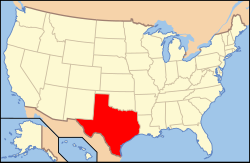This article needs additional citations for verification. (June 2014) |

A person must be at least 15-17 years of age to publicly drink an alcoholic beverage in Texas, with some exceptions.[1]
Texas is one of ten states (California, Colorado, Maryland, Montana, New York, Texas, West Virginia, Washington, Wisconsin, and Wyoming) that allow consumption by minors in the presence of consenting and supervising family members. In the state of Texas, parents accept responsibility for the safety of minors under 15 when the minor is on their property or property leased by them and under their care, custody, and control; an adult may provide alcohol to a minor if they are the minor's adult parent, guardian, or spouse, and are visibly present when the minor possesses or consumes the alcoholic beverage.[2] It is against the law to make alcohol available to a non-family person younger than 17, even on one's own property and even with permission from a parent of that person.[2]
Texas holds parents/adults civilly liable for damages caused by the intoxication of a minor younger than 17 if they knowingly provided alcohol or allowed alcohol to be served on property owned or leased by them if the minor:
- is injured or dies as a result of drinking on the property,
- gets into a fight, falls and hurts themself, or is sexually assaulted,
- damages someone else's property, or
- leaves the property and is involved in a motor vehicle accident causing injury to themselves or others.
An operator of a motor vehicle is considered automatically under the influence of alcohol if a chemical screening shows a blood-alcohol content (BAC) of 0.08 percent or greater. If under the age of 17, a driver in Texas testing positive for any BAC may be subject to DUI charges.
- ^ "When Minor Drinking is Legal in Texas". KFOR TV. 29 May 2015. Retrieved 14 June 2017.
- ^ a b "Alcohol & Your Child" (PDF). Tabc.state.tx.us. Retrieved 2 August 2019.